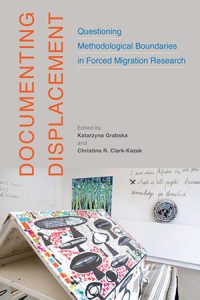Documenting Displacement: Questioning Methodological Boundaries in Forced Migration Research

Editor: Katarzyna Grabska & Christina R. Clark-Kazak
Publisher: McGill-Queen’s University Press
Year of Publication: 2022
Print Length: 424 pages
Genre: Academic / Methodology & Methods, Non-Fiction / International Relations, Political Science,
Topic: Research, Research Methods, Arts-Based Method, Bottom-Up Research, Insider & Outsider Researcher, Asylum & Asylum Seekers, Refugees & Forced Migration, Collaboration & Participation, Ethics & Morality, Media & Narratives, Legality & Illegality, Mobility & Immobility, Ownership, Politics & Power, Representation, Scholarship & Knowledge
A timely assessment of the ways in which knowledge is co-created in spaces of displacement, and how it is reproduced through narratives.
Legal precarity, mobility, and the criminalization of migrants complicate the study of forced migration and exile. Traditional methodologies can obscure both the agency of displaced people and hierarchies of power between researchers and research participants. This project critically assesses the ways in which knowledge is co-created and reproduced through narratives in spaces of displacement, advancing a creative, collective, and interdisciplinary approach.
Documenting Displacement explores the ethics and methods of research in diverse forced migration contexts and proposes new ways of thinking about and documenting displacement. Each chapter delves into specific ethical and methodological challenges, with particular attention to unequal power relations in the co-creation of knowledge, questions about representation and ownership, and the adaptation of methodological approaches to contexts of mobility. Contributors reflect honestly on what has worked and what has not, providing useful points of discussion for future research by both established and emerging researchers.
Innovative in its use of arts-based methods, Documenting Displacement invites researchers to explore new avenues guided not only by the procedural ethics imposed by academic institutions, but also by a relational ethics that more fully considers the position of the researcher and the interests of those who have been displaced.
Table of Contents
Figures and Tables
Acknowledgments
Introduction: Documenting Displacement beyond Methodological and Ethical Boundaries — Christina R. Clark-Kazak & Katarzyna (Kasia) Grabska
SECTION ONE: ETHICS, POWER, AND KNOWLEDGE
— Christina R. Clark-Kazak
1. Ethical Challenges of Conducting Longitudinal Community-Based Research with Refugees: Reflections from Peer Researchers — Anna Oda, Adnan Al Mhamied, Riham Al-Saadi, Neil Arya, Mona Awwad, Oula Hajjar, Jill Hanley, Michaela Hynie, Nicole Ives, Rabih Jamil, Mahi Khalaf, Rim Khyar, Ben C. H. Kuo, May Massijeh, Rana Mohammad, and Kathy Sherrell
2. Critical Reflexivity and Decolonizing Narrative: Reflections from the Field — Dina Taha
3. Exhibiting Displacement: Refugee Art, Methodological Dubiety, and the Responsibility (Not) to Document Loss — Evropi Chatzipanagiotidou and Fiona Murphy
4. Ethical and Methodological Issues When Conducting Research with Children in Situations of Forced Migration — Jason Hart
5. Modalities of Knowing in Difficult Circumstances: Methodological and Ethical Parameters of Engagement with Southern/South Sudanese Residing in the Capital of Sudan — Azza Ahmed Abdel Aziz
SECTION TWO: REIMAGINING DISPLACEMENT RESEARCH THROUGH CREATIVE COLLABORATIVE METHODOLOGIES
— Christina R. Clark-Kazak
6. Sound and Memory: Collaborative Reflection on Using Sound Postcards in Rebuilding Social Fabric with Victims of Forced Displacement in Colombia — Andrea Rodriguez-Sánchez and Miguel Alonso-Cambrón
7. Transient Lives and Lasting Messages: Graffiti Analysis as a Methodological Tool to Capture Migrants’ Experiences While on the Move — Océane Uzureau, Marina Rota, Ine Lietaert, and Ilse Derluyn
8. In Whose Voice? And for Whom? Collaborative Filming and Narratives of Forced Migration — Katarzyna Grabska
9. Methodological and Ethical Reflections on the Displaces Participatory Photographic Project in the “Calais Jungle” — Marie Godin and Giorgia Donà
10. Memories, Stories, and Material Traces: Exploring Displacement through Collaging and Participatory Art Installation — Nihal Soğancı
SECTION THREE: CROSSING METHODOLOGICAL AND DISCIPLINARY BOUNDARIES
— Christina R. Clark-Kazak
11. Opportunities and Challenges of Using Computer-Based Simulation in Migration and Displacement Research: A focus on Lesbos, Greece — Erika Frydenlund and Jose J. Padilla
12. Overcoming Over-Research: The MMP Approach — Susan Banki and Nicole Phillips
13. Life Story Narratives, Memory Maps, and Video Stories: Spatial Narratives of Urban Displacement in Sri Lanka — Sashini Gamage and Danesh Jayatilaka
14. The Worn Words Project: Narrative Mobilization, Refugee Discourse, and Digital Media Production — Erin Goheen Glanville
Contributors
Index

Katarzyna Grabska is a social anthropologist, her research focuses on gender, generation, youth, displacement, refugees, return of displaced populations, impact of war on gender and generational relations, and identities, access to rights for refugees in urban settings, art and activism in the context of war and conflict. Katarzyna has researched since 2002 on displacement and forced migration issues in Egypt, Kenya, Sudan, South Sudan, Ethiopia, Jordan, Ghana, Kyrgyzstan, and Vietnam. She works with visual media, art-based research, feminist methodologies, and participatory methodologies. Since 2002, she has been carrying out a longitudinal study of gender relation transformations among Nuer from South Sudan in Egypt, Kenya, South Sudan and in Sudan, Khartoum. She collaborates often with artists in her research, and engages with art-based research to understand issues of belonging, displacement, mobilities and identities. She also is a film-maker.
Source: https://www.prio.org/people/8217
More from Katarzyna Grabska in this library, click here.

Christina R. Clark-Kazak is a Professor at the School of Public and International Affairs, University of Ottawa. She was Past President of the International Association for the Study of Forced Migration and immediate past Editor-in-chief of Refuge: Canada’s Journal on Refugees. She has served as President of the Canadian Associate for Refugee and Forced Migration Studies, Director of York University’s Centre for Refugee Studies and Associate Principal (Research and Graduate Studies) at York’s bilingual Glendon campus. Her work is published in books and articles in international migration and development. She collaborates with community partners to provide experiential learning opportunities in courses related to human rights, migration, democratization and research methods. Christina has authored and edited books, articles and policy briefs on ethics, methodology, forced migration and age discrimination. She is regularly invited to contribute to public education, policy-making and media discussions.
Source: https://uniweb.uottawa.ca/members/2796 & https://www.uottawa.ca/research-innovation/hrrec/people/clark-kazak-christina
More from Christina R. Clark-Kazak in this library, click here.
